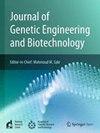Comprehensive examination of demographic, psychological, cognitive, biochemical, and genetic profiles of methamphetamine addicts
IF 2.8
Q3 Biochemistry, Genetics and Molecular Biology
Journal of Genetic Engineering and Biotechnology
Pub Date : 2025-10-07
DOI:10.1016/j.jgeb.2025.100564
引用次数: 0
Abstract
Methamphetamine (MA) addiction is a serious public health concern with wide-ranging neurobiological and behavioral effects. This study aimed to assess the demographic, psychological, cognitive, biochemical, and genetic profiles of individuals with methamphetamine dependence, focusing on neurotransmitter levels and the expression of addiction- and aggression-related genes. Sixty male methamphetamine users and thirty age-matched healthy controls were recruited. Participants underwent psychological assessments, cognitive testing, and biochemical evaluation of serotonin and dopamine levels using ELISA. Gene expression of SLC6A4 and COMT was quantified via real-time PCR. Significant alterations were observed in the methamphetamine group compared to controls, including reduced serotonin (17.1 ± 3.1 vs. 20.5 ± 3.2 ng/mL; p = 0.002) and dopamine levels (46.3 ± 7.2 vs. 52.4 ± 6.5 ng/mL; p = 0.015), as well as down-regulation of SLC6A4 (0.64-fold vs. 1.00; p = 0.001) and up-regulation of COMT (1.47-fold vs. 1.00; p = 0.028). These biochemical and genetic changes were correlated with increased aggression and cognitive impairments. The findings underscore the impact of prolonged MA use on neurochemical balance and gene expression, contributing to the development of aggressive behaviors and addictive patterns. Tailored treatment strategies that integrate genetic and psychological profiling, along with longitudinal monitoring, are essential to address the multifactorial nature of methamphetamine addiction and improve clinical outcomes.
甲基苯丙胺成瘾者的人口学、心理、认知、生化和遗传特征的综合检查
甲基苯丙胺(MA)成瘾是一个严重的公共卫生问题,具有广泛的神经生物学和行为影响。本研究旨在评估甲基苯丙胺依赖个体的人口学、心理、认知、生化和遗传特征,重点关注神经递质水平和成瘾和攻击相关基因的表达。招募了60名男性冰毒使用者和30名年龄匹配的健康对照者。参与者使用ELISA进行了心理评估、认知测试和血清素和多巴胺水平的生化评估。实时荧光定量PCR检测SLC6A4和COMT的基因表达。与对照组相比,甲基苯丙胺组血清素(17.1±3.1比20.5±3.2 ng/mL, p = 0.002)和多巴胺水平(46.3±7.2比52.4±6.5 ng/mL, p = 0.015)降低,SLC6A4下调(0.64倍比1.00,p = 0.001), COMT上调(1.47倍比1.00,p = 0.028)。这些生化和遗传变化与攻击性和认知障碍的增加有关。研究结果强调了长期使用MA对神经化学平衡和基因表达的影响,有助于攻击性行为和成瘾模式的发展。结合遗传和心理分析以及纵向监测的量身定制的治疗策略对于解决甲基苯丙胺成瘾的多因素性质和改善临床结果至关重要。
本文章由计算机程序翻译,如有差异,请以英文原文为准。
求助全文
约1分钟内获得全文
求助全文
来源期刊

Journal of Genetic Engineering and Biotechnology
Biochemistry, Genetics and Molecular Biology-Biotechnology
CiteScore
5.70
自引率
5.70%
发文量
159
审稿时长
16 weeks
期刊介绍:
Journal of genetic engineering and biotechnology is devoted to rapid publication of full-length research papers that leads to significant contribution in advancing knowledge in genetic engineering and biotechnology and provide novel perspectives in this research area. JGEB includes all major themes related to genetic engineering and recombinant DNA. The area of interest of JGEB includes but not restricted to: •Plant genetics •Animal genetics •Bacterial enzymes •Agricultural Biotechnology, •Biochemistry, •Biophysics, •Bioinformatics, •Environmental Biotechnology, •Industrial Biotechnology, •Microbial biotechnology, •Medical Biotechnology, •Bioenergy, Biosafety, •Biosecurity, •Bioethics, •GMOS, •Genomic, •Proteomic JGEB accepts
 求助内容:
求助内容: 应助结果提醒方式:
应助结果提醒方式:


